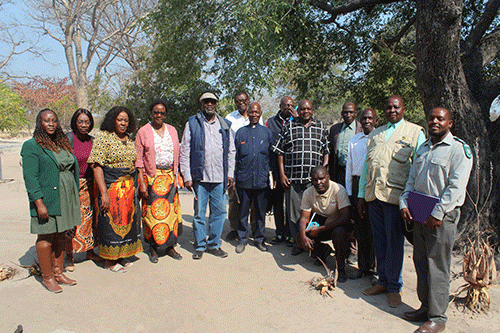George Sanzila
DIVUNDU – Hambukushu chief Erwin Munika Mbambo wants the Nature Conservation Ordinance of 1975 repealed.
The law, in Mbambo’s fervent view, is outdated and represents the repugnant colonial era.
The chief made the statement recently during a consultative meeting with the parliamentary standing committee on natural resources which was conducting public hearings on human-wildlife conflict. The hearings, which commenced in the Zambezi region and the two Kavango regions, followed the recent tabling of a motion on human-wildlife conflict in the National Assembly.
Mbambo said his community has been consulted multiple times over the issue of human-wildlife conflict.
He noted that the 2018-2027 revised national policy on human-wildlife conflict management lacked consultations, leading to its colossal failure to address the challenges associated with it.
The protracted Wildlife and Protected Areas Management Bill, which has been in discussions for more than 20 years, is envisaged to replace the Conservation Ordinance of 1975 to address a wide range of shortcomings in the management of natural resources.
The Hambukushu chief further took issue with how Namibia bows to international pressure in the management of its own natural resources.
According to him, tendencies by international conservation pressure groups to dictate how African countries should manage their natural resources without understanding the social dimensions and realities of local communities in those countries, continue to affect and impoverish people, particularly at the grassroots level.
“Restrictions imposed by the Convention on International Trade in Endangered Species of Wild Fauna and Flora (CITES) have contributed to the reduction in the number of hunting quotas allocated to conservancies for some species, despite their ballooning populations,” Mbambo stressed.
He further accused government of sidelining traditional authorities in the management of natural resources.
“Why should we manage our natural resources based on the interests of foreign governments at the expense of our own people? In the past, government collaborated with traditional authorities. We now have to ask for permission to use our own natural resources,” he moaned. The Hambukushu community, who live adjacent to the Bwabwata and Mahongo National Parks, have for years complained about increasing cases of human-wildlife conflict in the area, and the slow response from the Ministry of Environment, Forestry and Tourism when such cases are reported, including procrastination in the payment of compensation claims. They also suggested that a deliberate policy aimed at regularly harvesting problem animals in order to reduce their populations be introduced.
* George Sanzila works for the National Assembly in the Division: Research, Information, Publications and Editorial Services.


